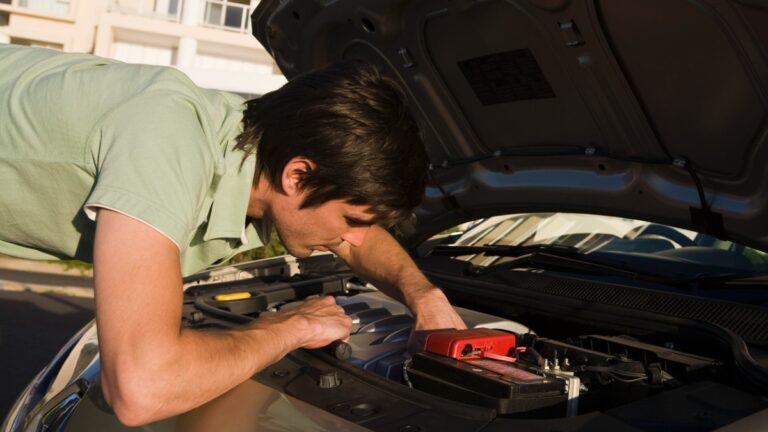Why Are My Car Brakes Locking Up When I Reverse? How To Fix It
Every driver understands the value of a properly working brake system. It’s a scary experience when your brakes fail to work as expected. Have you ever experienced lock-up brakes while in reverse? Perhaps you’re wondering what you can do when caught up in such a situation.
Worn-out brake pads can make the car brakes lock up while in reverse. The poor condition of the pads can’t offer a firm grip on the rotor. Remove the brake pad to look for clogs or signs of friction. If there is no presence, just replace the pads.
The brakes are an essential safety feature of your car. They allow slowing down or stopping instantly to avoid serious accidents. Poorly maintained brakes that you don’t inspect regularly can let you down when you least expect.
How Do Car Brakes Work?
A braking system has various components that work together to stop or maneuver your vehicle. Pushing the brake pedal creates hydraulic pressure in the master cylinder. It pressurized brake fluid, brake pipes, and hoses to the pistons, which activate hydraulically in each wheel hub.
It forces friction on the pads onto rotating parts, making your car stop. Car brakes come in options including:
Disc Brakes
This braking system includes a brake disc, pad, and caliper. Applying the brake pedal makes pressurized hydraulic fluid squeeze the brake pad’s friction material against the surface of the rotating brake disc. It produces friction, making the car slow or stop.
Drum Brakes
This braking system includes brake shoes, hydraulic wheel cylinders, and a brake drum. Applying the brake pedal forces the two curved brake shoes with a friction material lining against the inner surface of the rotating brake drum by the hydraulic wheel cylinders.
It produces friction which makes the car stop or slow down.
ABS Brakes
An Anti-Locking Braking System (ABS) works by hindering, applying, and releasing pressure to a wheel decelerating too quickly. It optimizes the stopping force applicable without brakes locking up or the vehicle skidding.
The car’s ABS auto tests wherever you turn on the ignition. It turns off detecting a defect to allow the normal braking system to take over. An ABS warning light informs the driver about the defect.
Parking Brakes
Also known as a handbrake, you apply a lever mechanism to keep your car parked. The parking brakes activate parking components at the rear of the vehicle where the braking system is located.

Why Are Your Car Brakes Locking Up In Reverse?
Your car brake pads are metallic and wear down over time, making them too thin. When this happens, they are less likely to have an adequate grip on the rotor. Pressing the brake pedal will apply pressure on the piston that pushed the brake pad.
When your brake pads are worn out, they won’t apply appropriate pressure on the rotator to slow the car down. This leads to an anti-locking brake system where the wheels lock up while reversing the car.
It happens because the brakes can’t apply appropriate stopping power on the wheels because of their poor condition. This makes them lock up instead of slowing down the car as they should have.
What Happens When Your Brakes Lock Up?
When you push the brake pedal, the braking system engages to slow or stop the car. With the ABS, the brakes release on letting go of the pedal. The presence of issues in the system may cause it to fail to function properly.
Lock-up brakes remain engaged when they shouldn’t be. The car unexpectedly stops when trying to slow down, and the brakes lock up. An ABS system is designed to prevent this from happening. However, problems in the system may lead to lock-up while in reverse.
How To Fix It
Two things may make your car brakes lock up in reverse. The brake linings may be worn out and need replacing, or the parking brake is stuck. Try to see if you can remove the parking brake pad manually. Alternatively, take it off entirely to check under and see what’s happening.
After removing the brake pad, check for obstructions between the drum and the disc. The parts may be clogged with mud or rust. If you don’t see any blockage, look for bad spots resulting from friction while braking.
The absence of any proof of friction could mean that the problem results from worn-out linings that need replacing.
How Can You Prevent Your Car Brakes From Locking Up?
Poor adjustment may make your car brakes lock up while reversing. Regular inspection and maintenance by a professional mechanic will save you from this scenario. You must also check your fluid levels regularly. This may also cause the brakes to lock up while in reverse.
Alternatively, check the spring from the hand brake going to the rear wheel. Add lubricant and ensure that the hand brake spring is released, and the problem will disappear.
Bottom Line
You must understand why your car brakes may lock up in reverse. Understanding this will ensure you don’t end up in the same scenario. Equally important is to know the measures you can consider to get yourself out of the problem.







